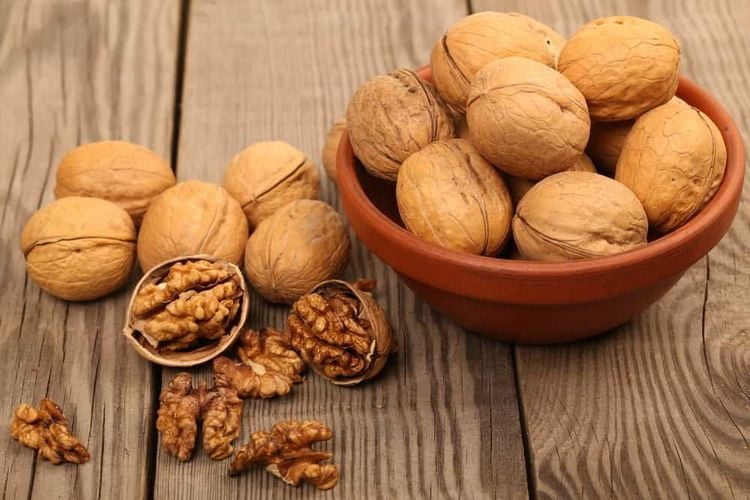This is an automatically translated article.
Walnuts are native to the Mediterranean region and Central Asia. Walnuts are rich in omega-3 fats and contain higher amounts of antioxidants than most other foods.
1. Nutritional value
Eating walnuts can improve brain health and prevent heart disease and cancer. Walnuts are often eaten alone as a snack but can also be added to salads, pastas, breakfast cereals, soups, and baked goods. It was also once used to make walnut oil, an expensive cooking oil often used in salad dressings. Walnuts are made up of 65% fat and about 15% protein. It's low in carbs - most of which include fiber. In 30 grams of walnuts contain the following nutrients:
Calories: 185 Water: 4% Protein: 4.3 grams Carbs: 3.9 grams Sugar: 0.7 grams Fiber: 1.9 grams Fat : 18.5 grams Fat : Walnuts contain about 65% fat by weight. Like other nuts, most of the calories in walnuts come from fat. This makes them an energy-dense, high-calorie food.
Although walnuts are rich in fat and calories, studies show that they do not increase the risk of obesity when replacing other foods in the diet. Walnuts also contain more polyunsaturated fats than other nuts. The most common is an omega-6 fatty acid called linoleic acid. They also contain a relatively high percentage of the healthy omega-3 fatty acid alpha-linolenic acid (ALA), which makes up about 8%-14% of the total fat content. ALA is particularly beneficial for heart health. It also helps reduce inflammation and improves the composition of fats in the blood. Furthermore, ALA is a precursor to the long-chain omega-3 fatty acids EPA and DHA, which have been linked to many health benefits.

Hạt óc chó có giá trị dinh dưỡng cao với nhiều chất dinh dưỡng thiết yếu
Observational studies have shown that a daily gram of ALA reduces the risk of dying from heart disease by 10%.
2. Vitamins and minerals
Walnuts provide several vitamins and minerals, including:
Copper: This mineral promotes heart health. It also helps maintain the function of bones, nerves, and the immune system.
Folic acid: Also known as folate or vitamin B9, folic acid has many important biological functions. Folic acid deficiency during pregnancy can cause birth defects.
Phosphorus: About 1% of the body is made up of phosphorus, a mineral mainly found in bones.
Vitamin B6: This vitamin may boost the immune system and support nerve health. Vitamin B6 deficiency can cause anemia.
Manga: This trace mineral is found in the highest amounts in nuts, whole grains, fruits and vegetables.
Vitamin E: Compared to other nuts, walnuts contain high levels of a special form of vitamin E called gamma-tocopherol.

Vitamin và các khoáng chất được tìm thấy trong óc chó có lợi với người dùng
3. Other compounds
Walnuts contain a complex mixture of bioactive plant compounds.
In fact, walnuts came in second in a study that investigated the antioxidant content of 1,113 foods commonly eaten in the United States. Some notable plant compounds in walnuts include:
Ellagic acid: This antioxidant is found in high amounts in walnuts, along with other related compounds such as ellagitannin. Ellagic acid may reduce the risk of heart disease and cancer. Walnuts have higher antioxidant activity than any other common nut. This activity comes from vitamin E, melatonin, and plant compounds called polyphenols, which are especially high in the skin of walnuts. Catechin: Catechin is a flavonoid antioxidant that may have a variety of health benefits, including promoting heart health.
Melatonin: This neurohormone helps regulate the body clock. It is also a powerful antioxidant that may reduce the risk of heart disease. Phytic acid: Phytic acid, or phytate, is a beneficial antioxidant, although it may decrease the absorption of iron and zinc from the same meal.
4. Health Benefits of Walnuts
Walnuts are linked with a number of health benefits. They have been linked to a reduced risk of heart disease and cancer, as well as improved brain function.
Lợi ích sức khỏe của quả óc chó đã được khoa học chứng minh
4.1 Heart Health Heart disease – or cardiovascular disease – is a broad term used for chronic conditions involving the heart and blood vessels.
In many cases, the risk of heart disease can be reduced with healthy lifestyle habits, such as eating nuts like walnuts. In fact, many studies show that eating walnuts can fight heart disease risk factors by: lowering LDL (bad) cholesterol, reducing inflammation, improving blood vessel function, and thus reducing risk of plaque buildup in the arteries.
These effects are likely caused by the beneficial fat composition of walnuts, as well as their rich antioxidant content.
4.2 Preventing Cancer Cancer is a group of diseases characterized by abnormal cell growth.
The risk of developing certain types of cancer can be reduced by eating healthy foods, exercising, and avoiding unhealthy lifestyle habits. Since walnuts are a great source of beneficial plant compounds, they can be an effective part of a cancer-preventing diet. Walnuts contain several bioactive components that may have anti-cancer properties, including: Phytosterols; gamma-tocopherol; omega-3 fatty acids; ellagic acid and related compounds; various polyphenol antioxidants.
4.3 Brain Health Several studies have shown that eating nuts can improve brain function. They also show that walnuts can help reduce depression and age-related decline in brain function. One study in older adults linked regular walnut consumption with significant memory improvements. However, these studies were observational and could not prove that walnuts were the cause of the improvement in brain function.
An 8-week study in 64 young, healthy people, found that eating walnuts improved comprehension. However, significant improvements in non-verbal reasoning, memory, and mood were not played.
Walnuts have also been shown to improve brain function in animals. When mice with Alzheimer's disease were fed walnuts every day for 10 months, their memory and learning skills were significantly improved.

Ăn quả óc chó giúp cải thiện sự hiểu biết của não bộ
5. Adverse effects
In general, walnuts are considered a precious food, but some people need to avoid them for the following reasons:.
Allergy to walnuts: Walnuts are one of the eight most allergenic foods. Symptoms of a walnut allergy are often severe and can include allergic shock (anaphylaxis), which can be fatal without treatment. People with a walnut allergy need to avoid these nuts completely. Reduced mineral absorption: Like all nuts, walnuts are high in phytic acid, phytic acid, or phytate, which is a plant substance that impairs the absorption of minerals like iron and zinc from the digestive tract. Walnuts are rich in heart-healthy fats and antioxidants. Furthermore, regularly eating walnuts can improve brain health and reduce the risk of heart disease and cancer. These nuts are easy to incorporate into the diet because they can be eaten on their own or added to a variety of foods. Simply put, eating walnuts can be one of the good things you can do to improve your health.
Reference source: healthline.com













